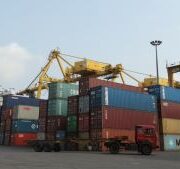Tag Archives | trade
Industry and trade, Information and Communications Technology, Private sector development
 Economics, Industry and trade
Economics, Industry and trade
 Economics, Environment, Industry and trade
Economics, Environment, Industry and trade
 Finance sector development, Industry and trade, Infrastructure, Regional cooperation and integration
Finance sector development, Industry and trade, Infrastructure, Regional cooperation and integration
 Video Blog
Video Blog
 Economics, Finance sector development, Industry and trade
Economics, Finance sector development, Industry and trade
 Industry and trade
Industry and trade
 Industry and trade, Regional cooperation and integration
Industry and trade, Regional cooperation and integration
 Industry and trade
Industry and trade
 Industry and trade
Industry and trade

Expanding trade opportunities for SMEs in Asia and the Pacific

Small and medium-sized enterprises (SMEs) are the backbone of the Asian economy. They already account for over 95% of all businesses in Asia and employ an estimated 60% of the region’s workforce (Mastercard and the Economist Intelligence Unit 2019). Hence, helping SMEs grow can translate directly into economic and workforce expansion.
Productivity spillovers from services firms in low- and middle-income countries: What is the role of firm characteristics and services liberalization?

It has been widely acknowledged that services play an important role for other industries, in particular manufacturing. A study by the Organisation for Economic Co-operation and Development (OECD) finds that services represent at least 30% of the value added in manufacturing exports (OECD 2014). Another study by the World Bank suggests that countries with a higher services content in their downstream economies are also those producing more complex goods (Saez et al. 2015).
How does trade openness affect the environmental Kuznets curve?

The People’s Republic of China (PRC) has reformed and opened up its economy for 4 decades. However, accompanying the country’s fast-growing gross domestic product (GDP) and trade sector, environmental degradation, such as deteriorating water quality, land deforestation, pollution, and frequent haze plagues, has attracted a great deal of attention.
Next generation of quality development and investment in the new Pacific trade pact

Earlier this month, the Pacific trade pact was reborn in Santiago as the 11-nation Comprehensive and Progressive Agreement for Trans-Pacific Partnership. While the headlines have been dominated by the absence of the United States and the level of trade gains each nation hopes to enjoy, let’s focus here on three less-remarked-upon sections of this revised treaty among Australia, Brunei Darussalam, Canada, Chile, Japan, Malaysia, Mexico, New Zealand, Peru, Singapore, and Viet Nam (the TPP11).
VIDEO BLOG: Remove trade barriers to improve health systems and lower patients’ costs

Trade in health products has been flourishing as more and more people demand better health. But countries around the world still apply tariffs and nontariff measures that jack up prices and curb the entry of pharmaceuticals, vaccines, and medical equipment.
How does exchange rate volatility affect value added and gross trade?

The rise of Donald Trump has reignited the debate on the link between exchange rates and trade. The Trump administration has blamed the exchange rate policies of the People’s Republic of China (PRC), Japan, and Germany for the current account deficit in the United States (US), and the president’s Twitter posts have put many major currencies on a roller coaster ride. Now, policy makers around the globe are concerned about the negative impact of exchange rate volatility on world trade.
Exploring the trade–urbanization nexus in developing economies: evidence and implications

Modern humans have been increasingly concentrated in cities. The United Nations forecasts that 60% of the world’s population will live in urban areas by 2030. Regional multilateral institutions such as the Development Bank of Latin America and the Asian Development Bank have stepped up their efforts to support the urban sector and to collaborate on comparative studies of urbanization.
RCEP – a life raft for trade liberalization in Asia

There seems to be a pushback against trade agreements in the post global financial crisis era. The Trans-Pacific Partnership (TPP) was signed in early 2016, but US presidential candidates have spared no effort criticizing it so near-term ratification is highly uncertain. The WTO Doha Round is in the deep freeze after 14 years of negotiations. Unilateral trade liberalization has virtually come to a standstill.
What Africa can learn from Asian supply chains

At this week’s 10th World Trade Organization (WTO) Ministerial Conference in Nairobi, Kenya, trade ministers are trying to advance 15 years of Doha Development Agenda talks to reduce trade barriers. The real issue, however, is whether African economies can follow East Asia's success in global supply chains amid “new normal" growth and rising inequality.
TPP as inspiration for the 10th WTO Ministerial Conference in Nairobi?

At the beginning of October, 12 Pacific Rim countries agreed on the Trans-Pacific Partnership (TPP) agreement. The TPP agreement has been hailed as a landmark trade pact, as it includes many issues that have so far not found their way into the rule of law in the multilateral trading system. As a reaction to the successful deal, World Trade Organization (WTO) Director-General Roberto Azevêdo announced that the TPP “will serve as an inspiration for WTO members” for the forthcoming 10th Ministerial Conference in Nairobi, Kenya. In this article, I argue that neither the process of TPP talks nor the content of the TPP agreement can provide a positive stimulus for the Doha Development Agenda (DDA) negotiations.


Search
Subscribe / Connect to Asia Pathways
Subjects
- Agriculture and natural resources
- Blog
- Capacity development
- Climate change
- Economics
- Education
- Energy
- Environment
- Finance sector development
- Gender
- Governance and public sector management
- Health
- Industry and trade
- Information and Communications Technology
- Infrastructure
- Miscellaneous
- Population
- Poverty
- Private sector development
- Regional cooperation and integration
- Sanitation
- Social development and protection
- Transport
- Uncategorized
- Urban development
- Video Blog
- Water
Recent Posts
- Artificial intelligence: A new driver for inclusive growth and development?
- Increasing trust in cross-border e-commerce and artificial intelligence
- Enhancing access to maternal and newborn healthcare in developing Asia
- Can electric vehicles lead the way to a sustainable future?
- Mitigating climate-related sovereign risk to accelerate action on the climate emergency




Recent Comments